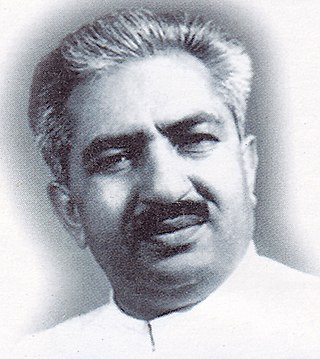Top Qs
Timeline
Chat
Perspective
Brahm Prakash (politician)
Chaudhary Brahm Prakash Indian politician From Wikipedia, the free encyclopedia
Remove ads
Chaudhary Brahm Prakash (16 June 1918 – 11 August 1993) was an Indian independence activist and politician who served as the first and youngest Chief Minister of Delhi and a freedom fighter who played an important role in the individual Satyagraha Movement launched by Mahatma Gandhi in 1940.He was president of the delhi pradesh congress committee , 4 time member of parliament and union minister for agriculture,food,irrigation and cooperatives.
Remove ads
Early life and independence movement
Summarize
Perspective
Chaudhary Brahm Prakash was born in the village of Shakurpur in Delhi.[1] He was among the leaders of the underground activities in Delhi during the Quit India movement. He was imprisoned many times during the Indian independence movement.[2][3]
Post-independence
Post-independence, Prakash served as Minister in charge of Planning and Development as well as the first Chief Minister of Delhi at the age of 34 years, the second-youngest Chief Minister in India, in 1952–55.[4][5] His stints in the Parliament twice won him accolades as an able parliamentarian. While he was with Congress Party, he was elected to the Lok Sabha from Delhi Sadar constituency in 1957, and from Outer Delhi in 1962 and 1967. He joined Janata Party later, and was elected to Lok Sabha again in 1977 from Outer Delhi. When the party split in 1979, he joined the Charan Singh faction, and became a minister for a few months. He made noteworthy contributions as the Union Cabinet Minister for Food, Agriculture, Irrigation and Cooperatives.[6]
The cause of depressed sections of the society, rural development and empowerment of the weaker sections were issues, which were very close to the heart of Prakash. He was quick to realise the potential of cooperative societies in mitigating the hardships of the village folks. As early as in 1945, he started organising village and agriculture cooperatives. He was also a proponent of the Panchayati Raj institutions. He organised the National Union of Backward Classes, Scheduled Castes, Scheduled Tribes and Minorities in 1977 to work for the welfare of these weaker sections.[7]
Prakash and Kurien of NDDB promoted the idea of Cooperative Companies to help free the cooperatives from the shackles of Government control through the Registrar of Cooperative Societies. It was a precursor to the present Producer Company model.[8][9][10]
Remove ads
See also
References
See also
External links
Wikiwand - on
Seamless Wikipedia browsing. On steroids.
Remove ads

